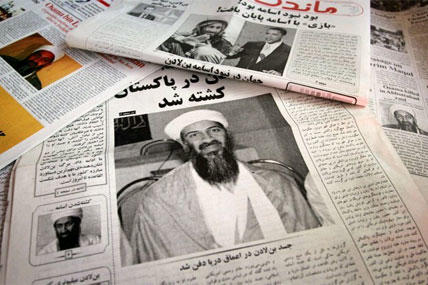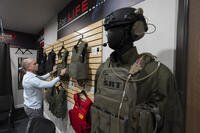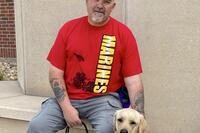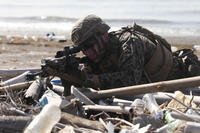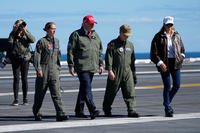The federal government chose to hold off on going to court Friday to block publication of a former Navy SEAL's first-hand account of the raid that killed Osama Bin Laden in the book "No Easy Day."
Pentagon officials said that consultations were underway with the Justice Department on a possible civil suit against the author of "No Easy Day" and his publisher, Penguin Group (USA)'s Dutton imprint.
"We're reviewing our options on this matter," said George Little, the Pentagon's chief spokesman. "We may in fact take action."
Little acknowledged the government could face a public relations disaster in prosecuting a decorated combat veteran who participated in "one of the greatest military and intelligence successes in our history."
Defense Department lawyers had obtained a copy of the book and had yet to determine whether any classified information was disclosed, Little said.
The author, who has been identified by multiple reports as Matt Bissonnette, had clearly violated two non-disclosure agreements he signed in 2007 to submit any book he might write to pre-publication review by the military, Little said.
In the book, the author, who writes under the pseudonym Mark Owen, gave grisly details on Bin Laden's death after he was shot in the head by a SEAL coming up the stairs in the Saudi terrorist's compound in Abbottabad, Pakistan.
"Blood and brains spilled out of the side of his skull," wrote Bissonnette. Bin Laden fell back onto a bedroom floor, his body twitching in death throes. Bissonnette wrote that he and other SEALs fired into his torso to make sure he was dead.
Bissonnette documented the killing.
"It was surreal trying to clean blood off the most wanted man in the world so that I could shoot his photo," he wrote.
Bissonnette said in the book that he and the other SEALs on the raid had a general disdain for President Obama but approved of Obama's handling of the announcement of Bin Laden's death.
In an appearance scheduled for the CBS' new show 60 Minutes that will air Sunday night, Bissonnette denied having any political motives for writing the book.
"My worry from the beginning is, you know, it's a political season. This book is not political whatsoever," Bissonnette said in an excerpt released by CBS. "You know, if these -- crazies on either side of the aisle want to make it political, shame on them. This is a book about Sept. 11, and it needs to rest on Sept. 11. Not be brought into the political arena, because this -- this has nothing to do with politics."
Jeh Johnson, the Defense Department's general counsel, wrote to a letter Thursday to Bissonnette's pseudonym, Mark Owen, warning that the government "is considering pursuing against you and all those acting in concert with you, all remedies legally available to us in light of this situation."
In response, Bissonnette's lawyer, Robert D. Luskin of the law firm Patton Boggs, wrote back Friday to Johnson that the author had "sought legal advice about his responsibilities before agreeing to publish his book and scrupulously reviewed the work to ensure that it did not disclose any material that would breach his agreements or put his former comrades at risk. He remains confident that he has faithfully fulfilled his duty."
Recent legal precedents take issue with Luskin's position. Last year, U.S. District Court judge Gerald Lee ruled that Ishmael Jones, a pseudonym for a former CIA field operative, had violated the law by not properly going through CIA's pre-publication review process for the book "The Human Factor: Inside the CIA's Dysfunctional Intelligence Culture."
The government won the case but did not seek to recover the profits or royalties, since Jones had already given them to charity.
The government also won in the 2010 non-disclosure agreement case against former Lt. Col. Anthony Shaffer for the book "Operation Dark Heart," an account of his stint in the Defense Intelligence Agency. In that case, the government bought up and burned 9,500 copies of the first run of the book to keep it out of the public's hands. That tactic might not be available in the matter of "No Easy Day."
Penguin has already moved up the publication date to next week and has greatly increased the number of copies in the first run, thereby increasing the cost to the government of any move to buy up the books, said Stephen Aftergood, director of the Project on Government Secrecy at the Federation of American Scientists.
"The publisher has raised the stakes here," Aftergood said. "But when the government challenges in these cases, the government usually wins."
In the case of "No Easy Day," Aftergood said the government "has to consider not only the awkward features of proceeding against a decorated combat veteran – they also have to consider the consequences of not proceeding. Will they be weakening the whole non-disclosure policy?"
Although a civil suit against Bissonnette and Penguin was most likely, Adm. William McRaven, head of U.S. Special Operations Command, held out the possibility of a criminal prosecution.
In a letter last week to his commanders, McRaven, who planned the Bin Laden raid, wrote: "If the U.S Special Operations Command finds that an active-duty, retired or former service member violated that agreement and that exposure of information was detrimental to the safety of U.S. forces, then we will pursue every option available to hold members accountable, including criminal prosecution where appropriate."
Bissonnette professed to be unconcerned. He wrote in the book that "Since May 1, 2011, everyone from President Obama to Adm. McRaven has given interviews about the operation. If my commander-in-chief is willing to talk, then I feel comfortable doing the same."
